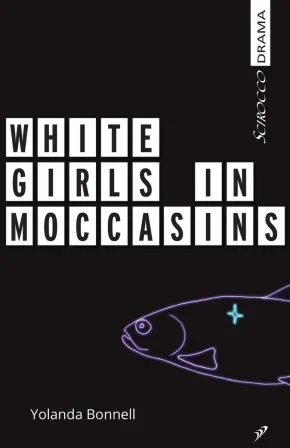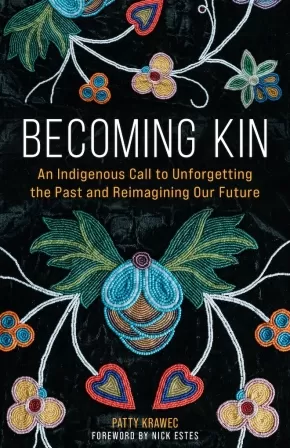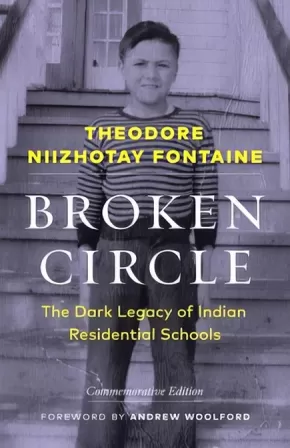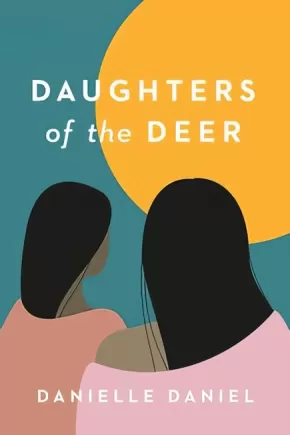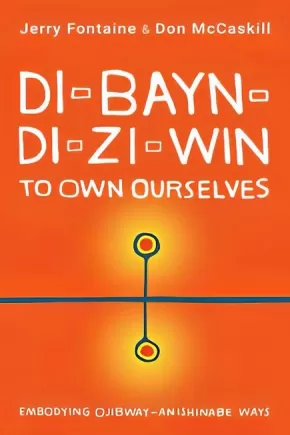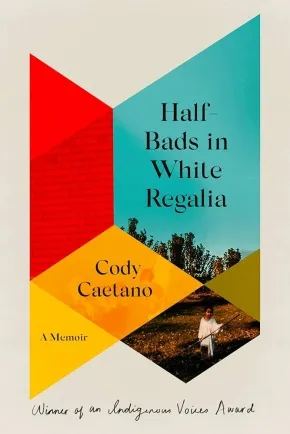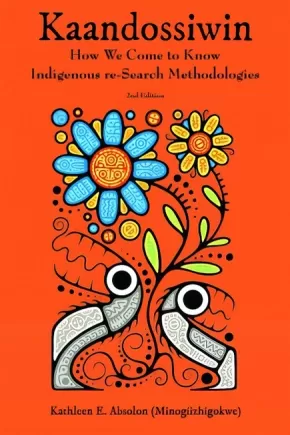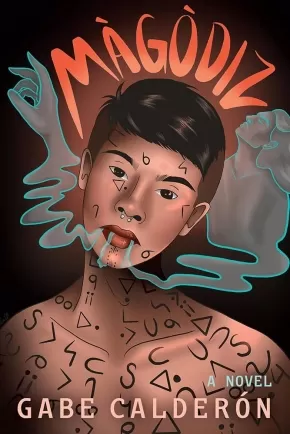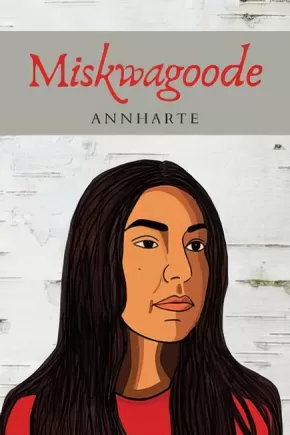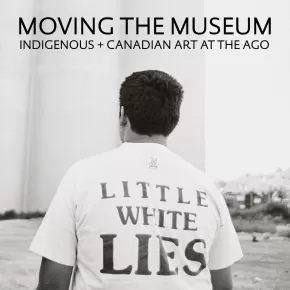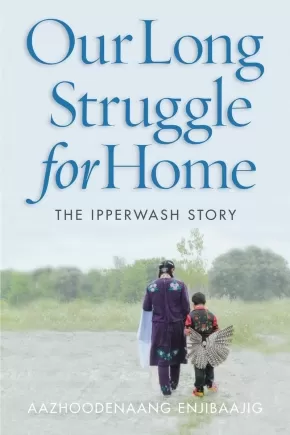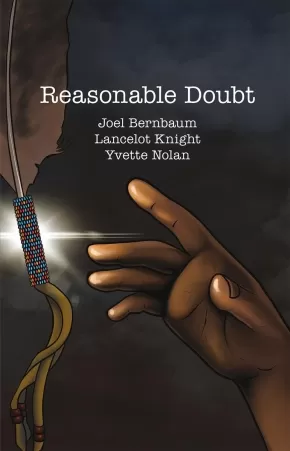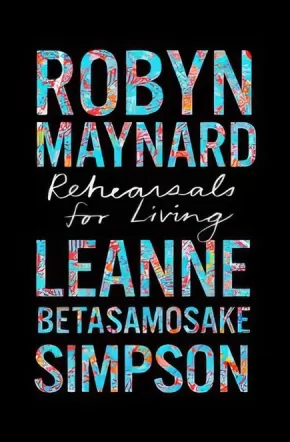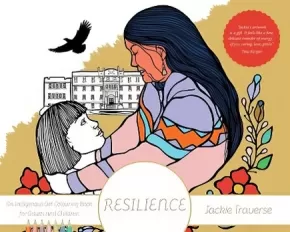
Anishinaabeg
76
-
90
of
200 Results;
Sort By
Go To
of 14
White Girls in Moccasins
$15.95
Format:
Paperback
Text Content Territories:
Indigenous Canadian; First Nations; Anishinaabeg; Ojibway;
Reading Level: N/A
ISBN / Barcode: 9781990738241
Synopsis:
Synopsis:
Miskozi is searching for something...There's something missing. And she's not sure what it is. She goes on a search for herself and her culture, accompanied by her inner white girl, Waabishkizi, and guided by Ziibi, a manifestation of an ancestral river, both provoking her to try and find the answers. She begins the journey back before she was even born, right at the seeds of colonization when her ancestors were forced to hide their culture anywhere they could. Burying their language.Their teachings.Their bundles.Their moccasins. White Girls in Moccasins is a hilarious and poignant reclamation story that world-hops between dreams, memories, and a surreal game show. Miskozi recounts her life and is forced to grapple with her own truth, while existing in a society steeped in white supremacy. A love letter to brown kids born in the 80s, surviving in the 90s and all those continuing to deeply reclaim.
Additional Information
72 pages | 5.50" x 8.50" | Paperback
Becoming Kin: An Indigenous Call to Unforgetting the Past and Reimagining Our Future (HC) (4 in Stock)
$36.49
Format:
Hardcover
Text Content Territories:
Indigenous Canadian; First Nations; Anishinaabeg; Ojibway; Lac Seul;
Reading Level: N/A
ISBN / Barcode: 9781506478258
Synopsis:
Synopsis:
We find our way forward by going back.
The invented history of the Western world is crumbling fast, Anishinaabe writer Patty Krawec says, but we can still honor the bonds between us. Settlers dominated and divided, but Indigenous peoples won't just send them all "home."
Weaving her own story with the story of her ancestors and with the broader themes of creation, replacement, and disappearance, Krawec helps readers see settler colonialism through the eyes of an Indigenous writer. Settler colonialism tried to force us into one particular way of living, but the old ways of kinship can help us imagine a different future. Krawec asks, What would it look like to remember that we are all related? How might we become better relatives to the land, to one another, and to Indigenous movements for solidarity? Braiding together historical, scientific, and cultural analysis, Indigenous ways of knowing, and the vivid threads of communal memory, Krawec crafts a stunning, forceful call to "unforget" our history.
This remarkable sojourn through Native and settler history, myth, identity, and spirituality helps us retrace our steps and pick up what was lost along the way: chances to honor rather than violate treaties, to see the land as a relative rather than a resource, and to unravel the history we have been taught.
Additional Information
224 pages | 5.81" x 8.53" | Hardcover
Braided Learning: Illuminating Indigenous Presence through Art and Story
$29.95
Format:
Paperback
Text Content Territories:
Indigenous Canadian; First Nations; Inuit; Métis;
ISBN / Barcode: 9780774880794
Synopsis:
Synopsis:
The Truth and Reconciliation Commission and Indigenous activism have made many non-Indigenous Canadians uncomfortably aware of how little they know about First Nations, Métis, and Inuit peoples. In Braided Learning, Susan Dion shares her approach to engaging with Indigenous histories and perspectives. Using the power of stories and artwork, Dion offers respectful ways to learn from and teach about challenging topics including settler-colonialism, treaties, the Indian Act, residential schools, and the Sixties Scoop. Informed by Indigenous pedagogy, Braided Learning draws on Indigenous knowledge to make sense of a difficult past, decode unjust conditions in the present, and work toward a more equitable future.
This book is a must-read for teachers and education students. It should also be read by students and practitioners in social work, child and youth counselling, policing, and nursing, or anyone seeking a foundational understanding of the histories of Indigenous peoples and of settler colonialism in Canada.
Reviews
“This book should be in every educator’s library. It serves as a model for educators to learn and teach about the history of Indigenous peoples and settler colonialism without fear or reservation. It is exactly what has been asked for over and over again.”— Tracey Laverty, First Nations, Inuit and Métis Education, Saskatoon Public Schools
"Braided Learning is a safe learning space for people at the start of their learning journey about Indigenous education and history. Each reader will take away the parts of the stories that are important to them, just like listeners do when we hear stories in the lodge from our elders. Nobody tells you what to do – you figure it out yourself with some subtle guidance." — Deb St. Amant, elder-in-residence, Faculty of Education, Queen’s University
"Understanding how educators can participate in reconciliation means understanding what stands in the way. Susan Dion understands both. Highly readable, engaging, and passionate, this book moves teachers from apprehension to action. Educators of all levels, read this book and take heed of Dion’s question: “So what are you going to do now?” — Amanda Gebhard, co-editor of White Benevolence: Racism and Colonial Violence in the Helping Professions
Educator Information
Table of Contents
Introduction: Indigenous Presence
1 Requisites for Reconciliation
2 Seeing Yourself in Relationship with Settler Colonialism
3 The Historical Timeline: Refusing Absence, Knowing Presence, and Being Indigenous
4 Learning from Contemporary Indigenous Artists
5 The Braiding Histories Stories / Co-written with Michael R. Dion
Conclusion: Wuleelham – Make Good Tracks
Glossary and Additional Resources: Making Connections, Extending Learning
Notes; Bibliography
Additional Information
288 pages | 6.00" x 9.00" | Paperback
Broken Circle: The Dark Legacy of Indian Residential Schools-Commemorative Edition - 2nd Edition
$24.95
Format:
Paperback
Text Content Territories:
Indigenous Canadian; First Nations; Anishinaabeg; Sagkeeng;
Reading Level: N/A
ISBN / Barcode: 9781772034158
Synopsis:
Synopsis:
A new commemorative edition of Theodore Fontaine's powerful, groundbreaking memoir of survival and healing after years of residential school abuse.
Originally published in 2010, Broken Circle: The Dark Legacy of Indian Residential Schools chronicles the impact of Theodore Fontaine’s harrowing experiences at Fort Alexander and Assiniboia Indian Residential Schools, including psychological, emotional, and sexual abuse; disconnection from his language and culture; and the loss of his family and community. Told as remembrances infused with insights gained through his long healing process, Fontaine goes beyond the details of the abuse that he suffered to relate a unique understanding of why most residential school survivors have post-traumatic stress disorders and why succeeding generations of Indigenous children suffer from this dark chapter in history. With a new foreword by Andrew Woolford, professor of sociology and criminology at the University of Manitoba, this commemorative edition will continue to serve as a powerful testament to survival, self-discovery, and healing.
Reviews
"Broken Circle is a life story of Mr. Fontaine and he said it like it was; 'his personal story affirms the tragedy that occurred during this era and the impacts it has on our Indigenous people today'. Mr. Fontaine's humbleness and care for his people was remarkable and no words will ever express what he meant to his people on Turtle Island." —Chief Derrick Henderson, Sagkeeng First Nation
“Theodore Fontaine has written a testimony that should be mandatory reading for everyone out there who has ever wondered, 'Why can’t Aboriginal people just get over Residential Schools?' Mr. Fontaine’s life story is filled with astonishing and brutal chapters, but, through it all, time, healing, crying, writing, friends and family, and love—sweet love—have all graced their way into the man, father, son, brother, husband, and child of wonder Theodore has always deserved to be. What a humbling work to read. I’m grateful he wrote it and had the courage to share it. Mahsi cho." —Richard Van Camp, Tłįchǫ author of The Lesser Blessed and Moccasin Square Gardens
Additional Information
224 pages | 5.50" x 8.50" | 2nd Edition | Paperback
Daughters of the Deer
$24.00
Format:
Paperback
Text Content Territories:
Indigenous Canadian; First Nations; Anishinaabeg; Algonquin; Haudenosaunee (Iroquois);
Reading Level: N/A
ISBN / Barcode: 9780735282087
Synopsis:
Synopsis:
In this haunting and groundbreaking historical novel, Danielle Daniel imagines the lives of women in the Algonquin territories of the 1600s, a story inspired by her family’s ancestral link to a young girl who was murdered by French settlers.
1657. Marie, a gifted healer of the Deer Clan, does not want to marry the green-eyed soldier from France who has asked for her hand. But her people are threatened by disease and starvation and need help against the Iroquois and their English allies if they are to survive. When her chief begs her to accept the white man’s proposal, she cannot refuse him, and sheds her deerskin tunic for a borrowed blue wedding dress to become Pierre’s bride.
1675. Jeanne, Marie’s oldest child, is seventeen, neither white nor Algonquin, caught between worlds. Caught by her own desires, too. Her heart belongs to a girl named Josephine, but soon her father will have to find her a husband or be forced to pay a hefty fine to the French crown. Among her mother’s people, Jeanne would have been considered blessed, her two-spirited nature a sign of special wisdom. To the settlers of New France, and even to her own father, Jeanne is unnatural, sinful—a woman to be shunned, beaten, and much worse.
With the poignant, unforgettable story of Marie and Jeanne, Danielle Daniel reaches back through the centuries to touch the very origin of the long history of violence against Indigenous women and the deliberate, equally violent disruption of First Nations cultures.
Reviews
“Danielle Daniel renders the stories of her ancestors vividly, poetically and with deep love and respect. Daughters of the Deer gives long overdue voices to the Indigenous women who came before. A subtle, moving demonstration of how colonization attempted to strip Indigenous women of their power and place, and a testament to the enduring strength and wisdom that no colonial power could extinguish.” —Jessica McDiarmid, author of Highway of Tears: A True Story of Racism, Indifference and the Pursuit of Justice for Missing and Murdered Indigenous Women and Girls
Additional Information
344 pages | 5.25" x 8.00" | Paperback
Di-bayn-di-zi-win (To Own Ourselves): Embodying Ojibway-Anishinabe Ways
$24.99
Format:
Paperback
Text Content Territories:
Indigenous Canadian; First Nations; Anishinaabeg; Ojibway;
Grade Levels: 12; University/College;
ISBN / Barcode: 9781459748996
Synopsis:
Synopsis:
A collaboration exploring the importance of the Ojibway-Anishinabe worldview, use of ceremony, and language in living a good life, attaining true reconciliation, and resisting the notions of indigenization and colonialization inherent in Western institutions.
Indigenization within the academy and the idea of truth and reconciliation within Canada have been seen as the remedy to correct the relationship between Indigenous Peoples and Canadian society. While honourable, these actions are difficult to achieve given the Western nature of institutions in Canada and the collective memory of its citizens, and the burden of proof has always been the responsibility of Anishinabeg.
Authors Makwa Ogimaa (Jerry Fontaine) and Ka-pi-ta-aht (Don McCaskill) tell their di-bah-ji-mo-wi-nan (Stories of personal experience) to provide insight into the cultural, political, social, and academic events of the past fifty years of Ojibway-Anishinabe resistance in Canada. They suggest that Ojibway-Anishinabe i-zhi-chi-gay-win zhigo kayn-dah-so-win (Ways of doing and knowing) can provide an alternative way of living and thriving in the world. This distinctive worldview — as well as Ojibway-Anishinabe values, language, and ceremonial practices — can provide an alternative to Western political and academic institutions and peel away the layers of colonialism, violence, and injustice, speaking truth and leading to true reconciliation.
Reviews
"Fontaine and McCaskill write in a way our own Indigenous People can understand and feel; their passion is tangible." — Graham Hingangaroa Smith, Distinguished Professor, Massey University - NZ
"There are multiple ways to inhabit our deepest principles. There are also many ways to honor land and our elders by embodying the teachings of both. Here is life found in kindness, loving, and truth. How do we access healing and how do we share this healing with others? Reading this book is one way. Tears of gratitude are for you both, Jerry Fontaine and Don McCaskill. Mahalo nui no ko ?ike nahenahe. Thank you for this mutual emergence shaped as much by friendship as it is by ?ike kupuna - elder knowledge. What is within these pages are ceremonial gifts offered to all who will take the time to connect with what is inevitable about our collective evolution." — Manulani Aluli Meyer, University of Hawai‘i
Additional Information
328 pages | 6.00" x 9.00" | Paperback
Half-Bads in White Regalia: A Memoir
$24.95
Format:
Paperback
Text Content Territories:
Indigenous Canadian; First Nations; Anishinaabeg;
Grade Levels: 12; University/College;
ISBN / Barcode: 9780735240858
Synopsis:
Synopsis:
A family tries to learn from the mistakes of past generations in this whirlwind memoir from a wholly original new voice.
The Caetanos move into a doomed house in the highway village of Happyland before an inevitable divorce pulls Cody’s parents in separate directions. His mom, Mindimooye, having discovered her Anishinaabe birth family and Sixties Scoop origin story, embarks on a series of fraught relationships and fresh starts. His dad, O Touro, a Portuguese immigrant and drifter, falls back into “big do, little think” behaviour, despite his best intentions.
Left alone at the house in Happyland, Cody and his siblings must fend for themselves, even as the pipes burst and the lights go out. His protective big sister, Kris, finds inventive ways to put food on the table, and his stoic big brother, Julian, facilitates his regular escapes into the world of video games. As life yanks them from one temporary solution to the next, they steal moments of joy and resist buckling under “baddie” temptations aplenty.
Capturing the chaos and wonder of a precarious childhood, Cody Caetano delivers a fever dream coming-of-age garnished with a slang all his own. Half-Bads in White Regalia is an unforgettable debut that unspools a tangled family history with warmth, humour, and deep generosity.
Awards
- 2023 Indigenous Voices Awards Winner: Published Prose in English
Reviews
“Memoirs are a difficult alchemy of testimony and confession, scene-making and character-building. They have to soften the hard things and show the way through at every turn—or at least they should—and that’s what Cody Caetano does in Half-Bads in White Regalia. No one gets off easy, but everyone is drawn with unflinching love and respect. Nothing seems wholly remarkable, yet everything is turned to see its beauty. Poetry permeates this prose, poetry and this wholly unique voice and style that somehow made me laugh and cry often, and in the oddest places. Read it. You won’t regret it. Telling you.”—Katherena Vermette, author of The Strangers
“A brilliant and devastating debut. This book hurtles towards difficult understandings about love and violence and family. At times I didn’t know whether I should laugh or cry, but Caetano fills each moment with such character and humanity that it’s impossible not to fall in love.” —Jordan Abel, author of NISHGA
Additional Information
280 pages | 5.62" x 8.25" | Paperback
Kaandossiwin: How We Come to Know: Indigenous Re-Search Methodologies - 2nd Edition
$32.00
Format:
Paperback
Text Content Territories:
Indigenous Canadian; First Nations; Anishinaabeg;
Grade Levels: University/College;
ISBN / Barcode: 9781773635170
Synopsis:
Synopsis:
Indigenous methodologies have been silenced and obscured by the Western scientific means of knowledge production. In a challenge to this colonialist rejection of Indigenous knowledge, Anishinaabe re-searcher Kathleen Absolon describes how Indigenous re-searchers re-theorize and re-create methodologies. Indigenous knowledge resurgence is being informed by taking a second look at how re-search is grounded. Absolon consciously adds an emphasis on re with a hyphen as a process of recovery of Kaandossiwin and Indigenous re-search. Understanding Indigenous methodologies as guided by Indigenous paradigms, worldviews, principles, processes and contexts, Absolon argues that they are wholistic, relational, inter-relational and interdependent with Indigenous philosophies, beliefs and ways of life. In exploring the ways Indigenous re-searchers use Indigenous methodologies within mainstream academia, Kaandossiwin renders these methods visible and helps to guard other ways of knowing from colonial repression. This second edition features the author’s reflections on her decade of re-search and teaching experience since the last edition, celebrating the most common student questions, concerns, and revelations.
Educator Information
Table of Contents
Part One: Preparation For The Search
1) An Introduction to Preparing for Re-Search: Having Tea & Bannock
Re-storying and restoring location
Restoring self: Locating My Self
Decolonizing and Indigenizing My Re-search
Language and Terminology
Chapter Outlines
2) Indigenous Re-Search: Past, Present and Future
Indigenous Peoples’ Cultural History and Research
Oral Traditions and Narrative
Indigenous Knowledge Resurgence: Shifting Landscapes
Trailblazers: Re-searchers and their Searches
3) Colonial Research Trauma My Own Search: A Journey of Making Meaning
4) The Search Trail and Pathway
Part Two: Wholistic Re-Search Methodologies
5) Wholistic Worldviews and Methodologies
6) The Roots: Paradigms, Worldviews and Principles
Paradigms and Worldviews
Principles
7) The Flower Centre: Self as Central
Self
Location
Situate Self in the Search
Memory
Motive and Purpose
Search for Congruency
8) The Leaves: The Methodological Journey
An Organic Process
Travelling
Transformation
Healing
9) The Stem: Backbone and Supports
Critical Consciousness
The Role of Critically Conscious Indigenous Scholars
Indigenous Searchers’ Strengths and Supports
10) The Petals: Diverse Methodologies
Spirit: Protocols, Ceremony and Honour
Heart: Relationships, Reciprocity and Community
Mind: Respecting Indigenous Knowledge
Body: Doing, Working and Creating
11) The Enviro-Academic Context
Fences and Gatekeepers
Allied Theories
The Committee
Writing Oral Traditions and Other Ironies
Thorny Prickly Challenges
12) Indigenist Re-Search Projects and Methodologies: The Last 10 Years
13) Leaving Good Footprints and Winding Down
Additional Information
304 pages | 6.00" x 9.00" | Paperback | 2nd Edition
Magodiz
$22.95
Format:
Paperback
Text Content Territories:
Indigenous Canadian; First Nations; Anishinaabeg; Algonquin;
Reading Level: N/A
ISBN / Barcode: 9781551528991
Synopsis:
Synopsis:
Magodiz (Anishinabemowin, Algonquin dialect): a person who refuses allegiance to, resists, or rises in arms against the government or ruler of their country.
Everything that was green and good is gone, scorched away by a war that no one living remembers. The small surviving human population scavenges to get by; they cannot read or write and lack the tools or knowledge to rebuild. The only ones with any power are the mindless Enforcers, controlled by the Madjideye, a faceless, formless spiritual entity that has infiltrated the world to subjugate the human population.
A'tugwewinu is the last survivor of the Andwanikadjigan. On the run from the Madjideye with her lover, Bel, a descendant of the Warrior Nation, they seek to share what the world has forgotten: stories. In Pasakamate, both Shkitagen, the firekeeper of his generation, and his life's heart, Nitawesi, whose hands mend bones and cure sickness, attempt to find a home where they can raise children in peace without fear of slavers or rising waters. In Zhong yang, Riordan wheels around just fine, leading xir gang of misfits in hopes of surviving until the next meal. However, Elite Enforcer H-09761 (Yun Seo, who was abducted as a child, then tortured and brainwashed into servitude) is determined to arrest Riordan for theft of resources and will stop at nothing to bring xir to the Madjideye. In a ruined world, six people collide, discovering family and foes, navigating friendship and love, and reclaiming the sacredness of the gifts they carry.
With themes of resistance, of ceremony as the conduit between realms, of transcending gender, Magodiz is a powerful and visionary reclamation that Two-Spirit people always have and always will be vital to the cultural and spiritual legacy of their communities.
Additional Information
304 pages | 6.00" x 9.00" | Paperback
Miskwagoode
$16.00
Format:
Paperback
Text Content Territories:
Indigenous Canadian; First Nations; Anishinaabeg;
Reading Level: N/A
ISBN / Barcode: 9781554201846
Synopsis:
Synopsis:
Taken from the Anishinaabe word for "woman," Miskwagoode is a lyrical portrayal of unreconciled Indigenous experience under colonialism, past and present.
Annharte is Miskwa, and so is Annharte's mother, who disappeared when the author was a girl. Miskwagoode is Annharte's book about her mother loss, her “mothermiss,” about all the women “buried in common enough/ cross-generational graves.”
Laced with humour and resilience but also hard-earned wisdom (“ominous progress ahead”), Annharte's fifth collection encompasses the poet's experiences as an Anishinaabe Elder, now experiencing the still-endemic inequalities of persisting colonialism, “witness not survivor.”
In her sly, cheeky riffs on life behind the “buckskin curtain” at the margins of settler society, Annharte talks about granny circles, horny old guys, and getting your hair done — the belonging her community offers. But she sets these poems about rez life against the background radiation: the poverty and the sickness, despair, violence, sexism, and sexual abuse that flow from unequal relationships.
Miskwagoode concludes with “Wabang,” a suite of short poems comprising Annharte's own thumbnail transcontinental Indigenous mythology.
Additional Information
80 pages | 6.00" x 9.00" | Paperback
Moving the Museum: Indigenous + Canadian Art at the AGO
$45.00
Artists:
Editors:
Format:
Hardcover
Text Content Territories:
Indigenous Canadian;
Grade Levels: 12; University/College;
ISBN / Barcode: 9781773102023
Synopsis:
Synopsis:
Moving the Museum documents the reopening of the J.S. McLean Centre for Indigenous & Canadian Art with a renewed focus on the AGO’s Indigenous art collection. The volume reflects the nation-to-nation treaty relationship that is the foundation of Canada, asking questions, discovering truths, and leading conversations that address the weight of history and colonialism.
Lavishly illustrated with more than 100 reproductions, Moving the Museum: Indigenous + Canadian Art at the AGO features the work of First Nations artists — including Carl Beam, Rebecca Belmore, and Kent Monkman — along with work by Inuit artists like Shuvinai Ashoona and Annie Pootoogook. Canadian artists include Lawren Harris, Kazuo Nakamura, Joyce Wieland, and many others. Drawing from stories about our origins and identities, the featured artists and essayists invite readers to engage with issues of land, water, transformation, and sovereignty and to contemplate the historic and future representation of Indigenous and Canadian art in museums.
Educator Information
Celebrates the renewed focus on Indigenous art at the J.S. McLean Centre for Indigenous & Canadian Art.
Features essays on the curatorial decisions made in redesigning the gallery, as well as pieces on individual artis and the history of Canadian, Indigenous, and Black art at the AGO.
Over 100 images, including art by Karoo Ashevak, June Clark, and Rebecca Belmore.
Additional Information
270 pages | 10.25" x 10.25" | Hardcover
Our Long Struggle for Home: The Ipperwash Story
$24.95
Format:
Paperback
Text Content Territories:
Indigenous Canadian; First Nations; Anishinaabeg; Ojibway; Chippewas of Kettle and Stony Point First Nation;
Reading Level: N/A
ISBN / Barcode: 9780774890571
Synopsis:
Synopsis:
Most Canadians know only a tiny part of the Ipperwash story – the 1995 police shooting of Dudley George. In Our Long Struggle for Home, George’s sister, cousins, and others from the Stoney Point Reserve tell of broken promises and thwarted hopes in the decades-long battle to reclaim their ancestral homeland, Aazhoodena, both before and after the police action culminating in George’s death.
Offering insights into Nishnaabeg lifeways and historical treaties, this compelling account conveys how government decisions have affected lives, livelihoods, and identity. We hear of the devastation wrought by forcible eviction when the government re-purposed Nishnaabeg ancestral territory as an army training camp in 1942, promising to return it after the war. By May 1993, the elders had waited long enough. They entered the still-functioning training camp, under cover of a picnic outing, and constituted themselves as the interim government of the reclaimed Stoney Point Reserve. The next two years brought cultural and social revival, though it was ultimately quashed as an illegal occupation.
Our Long Struggle for Home also shows what can be accomplished through perseverance and undiminished belief in a better future. This is a necessary lesson on colonialism, the power of resistance, persistence, and the possibilities inherent in recognizing treaty rights.
This is an important read for anyone who seeks a better understanding of the continuing influence of Canada’s colonial history and the injustices that Indigenous people have faced, and is a story that will inspire the Indigenous youth of today. It belongs in schools, public libraries, and reserves.
Reviews
"Our Long Struggle for Home is a beautiful articulation of Nishnaabeg world building and the deep relationality that is our practice to make and remake home. The Azhoodenaang Enjibaajig have gifted us the stories of their struggle to live as Nishnaabeg in their homeland and teach us how to live together in a way that brings forth more life." — Leanne Betasamosake Simpson, author of Noopiming: The Cure for White Ladies
"This is an incredible story about resistance and truth. Our Long Struggle for Home is critically important to the discussion about healing and reconciliation because it brings some clarity to what is taking place in Canada. It is brilliant in its simplicity." — Jerry Fontaine, former chief of the Sagkeeng First Nation
"This excellent book captures the honesty, dignity, and resilience of the Nishinaabe people involved in reclaiming their homeland at Stoney Point. It’s the first time the Ipperwash story has been told from their perspective; it’s a substantial contribution." — Justice Sidney B. Linden, commissioner for the Ipperwash Inquiry
"Our Long Struggle for Home is an excellent book of public education. It illustrates the havoc wreaked on Indigenous communities and complex outcomes of systemic poverty, frustration, and injustice. Through beautiful, and at times devastating, stories, it also offers powerful examples of healing, nourishment, and restoration." — Nicole Latulippe, assistant professor, Geography and Environmental Studies, University of Toronto Scarborough
Educator Information
Table of Contents
Foreword / John Borrows
Maps
Genealogy
Introduction
1 No Word for Surrender
2 “The House Was Gone”
3 Disruption and Determination
4 Under Cover of Prayer Meetings
5 Burying the Hatchet under a Peace Tree
6 Peacekeepers and Nation Builders
7 Taking the Barracks
8 September 5–6, 1995, Project Maple
9 September 5–6, 1995, from Our Point of View
10 After the Shooting
Epilogue: Two Boats Travelling Side by Side
Afterword: Learning to Be Treaty Kin / Heather Menzies
Notes; Index
Additional Information
208 pages | 6.00" x 9.00" | 2 maps, 1 genealogy chart | Paperback
Reasonable Doubt
$18.95
Format:
Paperback
Text Content Territories:
Indigenous Canadian;
Reading Level: N/A
ISBN / Barcode: 9780369103604
Synopsis:
Synopsis:
A significant moment in Canadian history is portrayed in this documentary musical about race relations between Indigenous and non-Indigenous people. Weaving hundreds of real interviews conducted with Saskatchewan residents and the court transcripts surrounding the killing of Colten Boushie and trial of Gerald Stanley, a kaleidoscopic picture is formed of the views of the incident, the province, and Indigenous people in Canada.
Reasonable Doubt—with interviews by Joel Bernbaum, music by Lancelot Knight, and dramaturgy by Yvette Nolan—provides a space to honestly talk to each other about what has happened on this land and how we can live together.
Reviews
“Verbatim theatre usually does a good job of putting the audience in the shoes of the people speaking, but Reasonable Doubt puts you in your own shoes and makes you deal with the mud splattered across them.” — Matt Olson, Saskatoon StarPhoenix
“At no point can the audience find refuge in the notion that this is only a play, only a script. Every line was actually spoken by someone Bernbaum interviewed.” — Marsha Lederman, The Globe and Mail
Additional Information
128 pages | 5.37" x 8.38" | Paperback
Rehearsals for Living (HC) (1 in Stock)
$32.00
Format:
Hardcover
Text Content Territories:
Indigenous Canadian; First Nations; Anishinaabeg; Mississauga; Alderville First Nation;
Reading Level: N/A
ISBN / Barcode: 9781039000650
Synopsis:
Synopsis:
A revolutionary collaboration about the world we're living in now, between two of our most important contemporary thinkers, writers and activists.
When the world entered pandemic lockdown in spring 2020, Robyn Maynard, influential author of Policing Black Lives, and Leanne Betasamosake Simpson, renowned artist, musician, and author of Noopiming: The Cure for White Ladies, began writing each other letters—a gesture sparked by a desire for kinship and connection in a world shattering under the intersecting crises of pandemic, police killings, and climate catastrophe. These letters soon grew into a powerful exchange about where we go from here.
Rehearsals for Living is a captivating and visionary work—part debate, part dialogue, part lively and detailed familial correspondence between two razor-sharp writers. By articulating to each other Black and Indigenous perspectives on our unprecedented here and now, and reiterating the long-disavowed histories of slavery and colonization that have brought us to this moment, Maynard and Simpson create something new: an urgent demand for a different way forward, and a poetic call to dream up other ways of ordering earthly life.
Reviews
“This book must be read for its future vocabularies, its political intimacies, its careful assemblage of the materials of our activisms, and its generous and fulsome thinking.”—Dionne Brand, poet, novelist, and essayist
“Using the age-old practice of letter writing and the land itself as a palimpsest, Robyn Maynard and Leanne Betasamosake Simpson find common ground to challenge the moral legitimacy of the settler nation state, and reinscribe new ways of what it means to be beings who are human in the forensic landscapes of Canada. In Rehearsals for Living, two women, one Indigenous, the other Black and African-descended confront their shared yet different experiences of colonialism, provide new and subversive meanings to the colonial trope of being landed, the mechanism by which the land was (un)settled. Unflinchingly, and in long-overdue and profoundly-needed “reasonings” that reverberate with shared breath, Simpson and Maynard weave their ideas, thoughts and reflections and their deep caring for community and society through the network of issues that impact us today—the pandemic and the differentials in treatment for Black and Indigenous people, the role of BLM, abolition, the necessity of Nibi and homespace for the Nishnaabeg, the joys of living on the land, and parenting in the face of ecological and racial disasters are but a few of the challenges they grapple with. Rehearsals for Living is fundamental to understanding the interlocking, founding crimes of the Americas; necessary for remembering the many erased histories of the on-going struggle for justice, and altogether indispensable to those wanting to create possible solutions.”—M. NourbeSe Philip, author of Zong!
Additional Information
336 pages | 5.46" x 8.32" | Hardcover
Resilience: Honouring the Children of Residential Schools
$24.00
Artists:
Format:
Paperback
Text Content Territories:
Indigenous Canadian;
Reading Level: N/A
ISBN / Barcode: 9781773635590
Synopsis:
Synopsis:
Resilience is the third colouring book made up of works by Anishnaabe artist Jackie Traverse. As with her previous highly successful colouring books, Sacred Feminine and IKWE, this new book contains both drawings and paintings by Jackie. Resilience honours the Indigenous Peoples who were colonized by and endured the violence of Canada’s child stealing systems — residential schools, the Sixties Scoop and child “welfare.” Some Indigenous people survived those systems; tragically, some did not. Jackie and her art pay tribute to and celebrate the resilience of Indigenous Peoples as they rebuild their communities and lives. Grassroots grandmother Geraldine (Gramma) Shingoose provides a foreword.
Reviews
“It is with great pride that I write this piece for Jackie’s next book. Her colouring books have had great meaning in my role as a Kokum to my grandgirl as we have been able to do this beautiful work together. I grew up learning beadwork and sewing from my grandmothers, who did not speak English, who did not grow up in Residential Schools, and they gave the best of themselves to me. This is what Jackie does for everyone who finds her work. She gives the best of herself, her culture, her gifts. Jackie is a fierce protector of culture and a generous, grand teacher. Her works are gifted to us through her books, her paintings in exhibits, her gifts of skateboards to young people, her live painting auctions for fundraising for the MMIWG2S and education scholarships for Indigenous youth, and in her amazing pieces for the public such as the Coca-Cola Olympics campaign and her project at the Red River College for the Innovation Centre. I have gifted her artwork to friends and family as she captures traditional teachings in her works and the gifting feels like a fine, delicate transfer of energy — of joy, caring, love, pride. I hope that is true for all who find this book by Jackie Traverse. The gift. I say Kichi miigwetch, a big thank you to Jackie Traverse for sharing with all of us.”— Tina Keeper
“Jackie Traverse is a beautiful Indigenous woman artist, leader and friend. Through her advocacy, activism and art, she inspires, supports and contributes so much to so many. I, among countless others, value and appreciate Jackie’s continued contributions. I look forward to copies of this book joining her earlier works, as well as the many pieces of art that I have the privilege of displaying in my office and home.”— Kim Pate
Additional Information
64 pages | 10.00" x 8.00" | Paperback Colouring Book
Sort By
Go To
of 14

